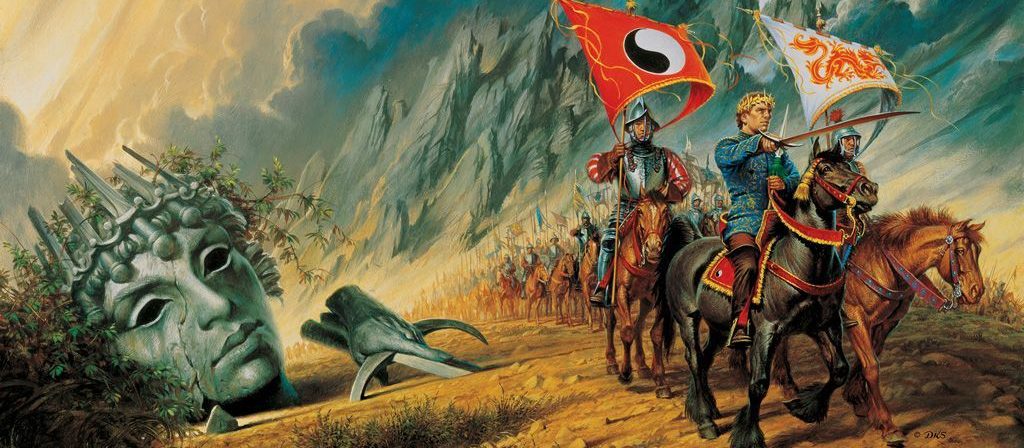

“Sometimes six and six make a dozen, and sometimes they make a mess.”
Excepting New Spring, which is a prequel and was originally published as a novella, The Path of Daggers is the shortest book in the Wheel of Time series. This can only be a good thing, considering Robert Jordan’s tendencies to repeat himself, over-describe appearances, and give names and miniature backstories to every passerby that the main cast crosses paths with on the street. With Jordan, the more succinct his writing, the better, especially when he’s just treading water for a paycheck as he is here.
Though he seems to have learned to exert a modicum of control over his most aggravating tendencies, there’s still an unwillingness to simply tell the story. There’s generally less sniffing and pouting and skirt-smoothing, and extraneous descriptions of the fit of each woman’s bodice are mercifully less prominent (though he has inserted several plot elements that give him plenty of room for lude “torture” content). And he’s perhaps finally realized that new readers aren’t jumping in at book eight and graciously refrains from re-capping. These intentional choices allow him to whittle a few hundred pages off of his typical doorstopper length. But even with a slimmer volume and less fluff, there are still scant few narrative highlights in a book otherwise characterized by fizzling subplots and a meandering central narrative. As usual, the story is interesting in outline form, but it moves at a snail’s pace and gets distracted by the silliest of details.
For posterity’s sake, the central narrative events in The Path of Daggers are as follows: The ladies—Elayne, Nynaeve, Aviendrha, etc.—use the magical Bowl of Winds to stop global warming; Elayne makes a play for the throne; Perrin rescues the deposed Queen Morgase from the Prophet of the Dragon and reunites with Elyas; Egwene consolidates her power as the new Amerylin Seat of the rebel sect of Aes Sedai; Rand, still mopey and on the brink of insanity, leads an army into a brutal battle that ends in stalemate when he tries to use his magical glass sword. Only two of these subplots seem to have large-scale significance: the Bowl of Winds plotline, which has been brewing for perhaps three books now, and Rand’s semi-successful campaign to thwart the Seanchan. But the only reason the latter is significant is that Rand is the only character who sees any development at all, even if Jordan overplays it and provides way too much detail. As for Mat, well, remember how Perrin was inexplicably absent from The Fires of Heaven? Mat, last seen in the cliffhanger ending of A Crown of Swords, is inexplicably given the same treatment here.
Around these precious few key events we are given the standard Jordan drivel—pointless conversations, petty arguments, layovers, excessive outlines of minor characters and their garb, adult women spanking each other. Thus far in the series, even when the narrative was barely moving forward, new elements were thrown in to mix things up; if not to keep the story fresh than at least to distract the reader from the lack of momentum. New enemies, new cultures, new magical artifacts, that sort of thing. There’s very little of that on tap here and the only break from the endless slog are a few chapters from non-main character points of view—the Forsaken, the Seanchan, the Black Ajah.
It is amazing to me how empty these books feel compared to the way they look tucked on a shelf or sitting on a night stand. Their massive size and colorful covers indicate that they will be filled with magical adventures. But even a relatively slim volume like The Path of Daggers is mostly just fluff. I had optimistically hoped to crank this series out in a year and a half; about one book per month. But here I am, going on two years and barely halfway through. As the plot thins out, the flaws become more apparent, and I struggle to continue. Series overviews indicate that I’ve got at least two more books until the pace starts to pick up. I commend those with the perseverance to plow through at a rapid pace; envy those with the iron will to drop the series midway through; and pity those who find Jordan’s hack writing to be the pinnacle of epic fantasy.